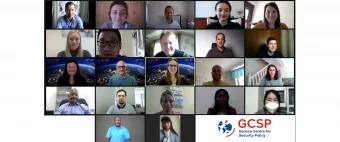Examining Global Security Challenges Impacting Europe in 2021

Examining Global Security Challenges Impacting Europe in 2021
Celebrating 25 years of the European Security Course (ESC)
This year, the European Security Course celebrates its 25th anniversary. This number is not only a reason to celebrate, it clearly shows that the interest in security in Europe and its impact on the other regions in the world is unbroken. For the next two months, 23 participants from 18 countries will strive to improve their knowledge, skills and expertise in a pressure cooker of culture, analysis and co-creation. 23 participants with remarkable backgrounds and experiences: 223 is the number of combined years of career experience of the 2021 European Security Course (ESC). This number is known as the “collective intelligence”
The 2021 edition of the ESC is unique for another two reasons. First, due to the COVID-19 challenge, the course is offered fully online. Second, it takes place during a turbulent period for Europe and other regions with the health, environment, and democracy crises overlapping.
For the past two and a half decades the ESC has been deepening security professionals’ understanding of the security policy challenges that impact Europe. As one of our esteemed Advanced Courses’ the ESC provides a comprehensive approach to developing the knowledge, skills and network of the participants. It prepares them for decision-making positions in peace and security. It enables them to advance in your career, be it in government, the private sector, international institutions, or other agencies engaged in security-related policy planning and decision-making.
An eight-week learning journey awaits our new cohort. It is a unique opportunity to deepen their understanding of European security issues in the broader international security context. It examines current trends and challenges in both hard and soft security, the European Union’s interests and impact, regional security architecture relevant to Europe (the EU, NATO, OSCE and the UN), and key state actors. It also analyses Europe’s interaction with and impact on its neighbours and other regions of the world, such as the Middle East, North Africa, sub-Saharan Africa, Asia and the Americas. Relevant transnational challenges are explored, including migration, terrorism, climate change, energy security and many others.
The next edition is in 2022. Will you join us? I am interested!
Course Focus
- Key Global Security Challenges
- The European Security Architecture
- Beyond the European Context
Regional Modules
- Wider Europe
- Europe, the Middle East and North Africa
- Europe and sub-Saharan Africa
- Europe and the Americas
- Europe and Asia
This course offers you a unique opportunity to:
- GRASP how global security trends impact Europe
- ANALYSE how Europe interacts with the world on security issues
- ENHANCE your skills to increase your effectiveness as a practitioner
- NETWORK with a wide community of security policy professionals European Security Course (ESC)
Anna Brach is Head of Human Security. Her work focuses on issues of environmental and health security with special emphasis on the climate change and security nexus. Her research interests include human security, human rights, environmental security, climate change, global public commons and resource management. She is responsible for developing and running the Human Security Cluster activities, including executive courses, workshops, and high-level conferences in Geneva and internationally. She is the Course Director for the European Security Course.
Colonel (GS) Markus Schneider has been seconded to the GCSP from the German Armed Forces in June 2020. Prior to joining the GCSP, Col Schneider supervised the Logistics department (G4) of the Rapid Forces Division in Stadtallendorf, one of the three divisions of the army which is responsible for Special Forces, Airborne operations and Army helicopters. In the field of logistics, he was also company and battalion commander in the Army and in the Joint Support Service. Col Schneider held an instructor and lecturer position for logistics at the Joint Operations department of the German Armed Forces Command and Staff College in Hamburg and was department head for logistics at battalion and brigade levels.
